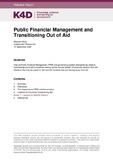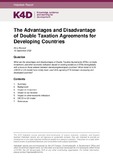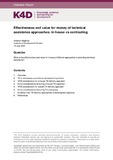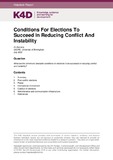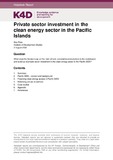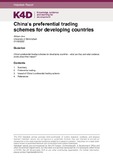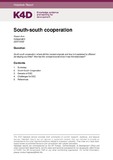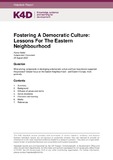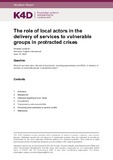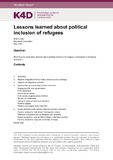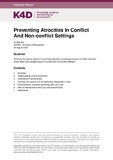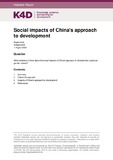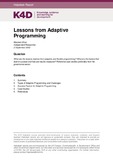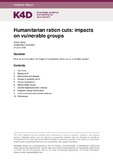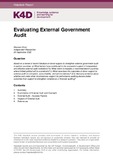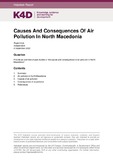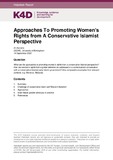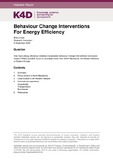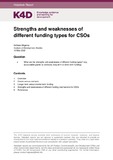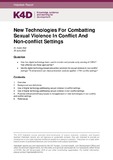K4D: Recent submissions
Now showing items 21-40 of 1138
-
Public Financial Management and Transitioning out of Aid
(Institute of Development Studies, 2022-09-13)This rapid review found an absence of literature focused specifically on measuring the impact of PFM and governance systems in countries that have transitioned from aid, by moving up the income ladder. However, there are ... -
The Advantages and Disadvantage of Double Taxation Agreements for Developing Countries
(Institute of Development Studies, 2022-09-16)When a developing and a developed country sign Double Taxation Agreements (DTAs), its generally the case that the developing country is the one that forgoes some of its tax revenues (Braun & Fuentes, 2016). Nevertheless, ... -
Effectiveness and Value for Money of Technical Assistance Approaches: In-house vs Contracting
(Institute of Development Studies, 2022-07-15)In the development field, technical assistance (TA) broadly refers to support for a specific project or country programme in the form of technical advice, research and data sharing, and skills training, among other activities. ... -
Conditions for Elections to Succeed in Reducing Conflict and Instability
(Institute of Development Studies, 2022-07)Post-conflict elections can pave the way for democratisation and peacebuilding, but can also lead to renewed conflict. Minimum conditions for ensuring that elections promote the former and reduce conflict and instability ... -
Private Sector Investment in the Clean Energy Sector in the Pacific Islands
(Institute of Development Studies, 2022-08-03)Most Pacific small island developing states (SIDS) have ambitious renewable energy targets which call for huge investment, a significant part of which is expected to come from the private sector (IFC, 2021). Although there ... -
China’s Preferential Trading Schemes for Developing Countries
(Institute of Development Studies, 2022-08-01)This literature review collates available evidence on China’s preferential trading schemes for developing countries. It draws on a diverse range of sources from multiple academic disciplines and grey literature. The review ... -
South-south Cooperation
(Institute of Development Studies, 2022-07-22)This rapid literature review collates available literature on South-South cooperation (SSC) (including the origins of the concept and how is it explained by different developing countries). It draws on a diverse range of ... -
Fostering a Democratic Culture: Lessons for the Eastern Neighbourhood
(Institute of Development Studies, 2022-08-25)Political culture is the values, beliefs, and emotions that members of a society express about the political regime and their role in it (Pickering, 2022, p. 5). Norms, values, attitudes and practices considered integral ... -
The Role of Local Actors in the Delivery of Services to Vulnerable Groups in Protracted Crises
(Institute of Development Studies, 2022-06-15)As the needs of people affected by conflict, natural disasters and other crises grow year-on-year and become increasingly complex, the need for adapted service delivery has become ever more pressing. There is widespread ... -
Lessons Learned about Political Inclusion of Refugees
(Institute of Development Studies, 2022-05)Most refugees and other migrants have limited opportunities to participate in politics to inform and influence the policies that affect them daily; they have limited voting rights and generally lack effective alternative ... -
Preventing Atrocities in Conflict and Non-conflict Settings
(Institute of Development Studies, 2022-08-26)Atrocity prevention refers to activities to prevent atrocity crimes against civilians. These include genocide, war crimes, crimes against humanity and ethnic cleansing, and can take place in both conflict and non-conflict ... -
Social Impacts of China's Approach to Development
(Institute of Development Studies, 2022-08-01)China has emerged as a significant global donor. Whilst there is much debate as to what constitutes Chinese foreign aid, expenditure of the Chinese government on aid grew significantly from the turn of the century linked ... -
Lessons from Adaptive Programming
(Institute of Development Studies, 2022-09-02)The aim of adaptive programming (AP) is to produce adaptive, flexible, iterative, responsive, problem-driven, politically smart, locally led programmes which are effective and efficient and meet donor requirements for ... -
Humanitarian Ration Cuts: Impacts on Vulnerable Groups
(Institute of Development Studies, 2022-06-27)Humanitarian ration cuts have had a wide range of devastating impacts on individuals, households, groups, and communities, who rely on this aid for survival. Humanitarian rations can include in-kind transfers, food vouchers ... -
Evaluating External Government Audit
(Institute of Development Studies, 2022-09-20)This rapid literature review of primary and grey sources found substantial evidence of the merits of donor support to Public Financial Management (PFM) initiatives but no specific evidence assessing donor support for ... -
Causes and Consequences of Air Pollution in North Macedonia
(Institute of Development Studies, 2022-09-06)This rapid literature review collates available evidence on the causes and consequences of air pollution in the Republic of North Macedonia (here after North Macedonia). It draws on a diverse range of sources from multiple ... -
Approaches to Promoting Women’s Rights from a Conservative Islamist Perspective
(Institute of Development Studies, 2022-09-14)Restrictions on women’s rights are a common challenge in conservative Islamic societies; while these societies are often highly patriarchal, religion (Islam) is typically used to justify such restrictions. Attempts to ... -
Behaviour Change Interventions for Energy Efficiency
(Institute of Development Studies, 2022-09-09)Behavioural interventions are policies and programmes that incorporate insights from scientists who study human behaviour (such as psychology and behavioural economics), with the aim of encouraging socially desirable ... -
Strengths and Weaknesses of Different Funding Types for CSOs
(Institute of Development Studies, 2022-05-10)Donors and civil society organisations (CSOs) have a shared interest in having an effective way of funding CSO projects or programmes – as well as an efficient and transparent process for awarding grants. CSOs that are ... -
New Technologies for Combatting Sexual Violence in Conflict and Non-conflict Settings
(Institute of Development Studies, 2022-06-30)There are a significant number of new technologies aimed at combatting sexual and gender-based violence (SGBV)—primarily in the form of “emergency mobile apps”, but they are generally geographically and culturally limited, ...

